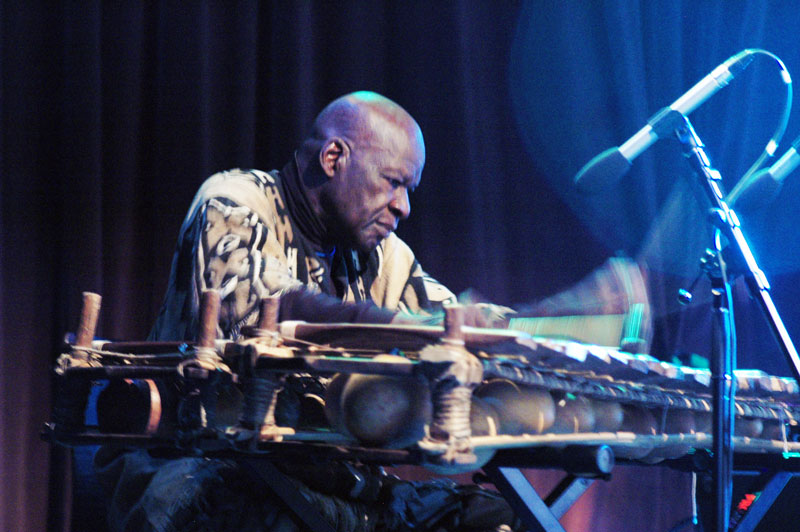Blog December 11, 2012
Keletigui Diabate, A Remembrance
I was very sorry to hear of the death of the great Malian maestro, Keletigui Diabaté, who passed away in Bamako on November 30, 2012—81 years old. Keletigui was a legend. Born in Kita, Mali, a balafon whiz kid from age 12, Keletigui also played violin and guitar, and made his way through a historic succession of acts—the Malian national orchestra, sideman for Ami Koita and other top griot singers, member of Salif Keita’s band Les Ambassadeurs du Motel, veteran of Toumani Diabaté’s instrumental super trio, and Habib Koite’s Bamada, to name just a few of his many achievements.
Keletigui lived Malian music history. Before his rise in Malian music, he worked in Guinea in the 50s with Fodeba Keita, founder of Les Ballets Africains. Keletigui went on to absorb jazz, Cuban music, and all manner of Afropop hybrids. He toured the US on a jazz project in 1980, and got to jam with Lionel Hampton. But Keletigui never lost his fidelity to Mande griot tradition, even has he restlessly reinvented it throughout his long, active career. It was Keletigui who devised the strategy of placing two diatonic balafons—tuned ½ step apart—side by side, so he could play all the notes on a piano. Today, this is standard practice for a whole generation of balafonists.
In a 1996 interview, Keletigui told me that his work with “administration bands,” those sponsored by the government, had taught him a lot, but also held him back. He was respected for his musicianship, but seen as a workman, rather than a “learned” musician. “I had the technique,” he said, “But I didn’t get the recognition in the administrations. You know, I was someone who is not educated in the administration milieu. But when you play well, you play well. That’s it, right? So I stayed like that, and people said I didn’t want big things. So I had that in my head. And then when people called me to accompany them, I came. I arranged their music. My knowledge was there at the disposal of everyone.”
Keletigui held onto that feeling of wanting to achieve more under his own name. He recorded one fine solo album, Sandiya (Contre Jour, 2004), but when I last saw him in New York with Habib Koite’s band in 2010, he was still restless, still keen to get back in the studio on his own and make a bigger statement of his own.
My truly enduring memories of Keletigui go back to the period when I lived in Bamako in the mid-90s. He lived not far from guitarist Djelimady Tounkara, my mentor on that trip. They were good friends with deep history going back to Kita, where they were both born. One of Djelimady’s first big gigs in Bamako had been playing rhythm guitar next to Keletigui’s lead guitar in the national orchestra, something the two veterans still joked about three decades later.
That was the era of the super trio of Keletigui, Toumani Diabaté, and Bassekou Kouyaté. I’ll never forget the night I went to dinner with Oumou Sangare at “the pizzaria” in Bamako, where the trio was playing an almost unimaginably informal gig. There was all sorts of banter and laughter between musicians and audience, and Keletigui brought the house down when he begged peoples’ indulgence while he sang with what he termed la voix du mouton (the voice of a sheep). The reference was pointed in the lead-up to the Muslim festival of sacrifice (Eid al-Adha or Tabaski), when bleating, groaning sheep were tied up outside every house in town. What emerged was something like Keletigui’s tribute to his old hero Louis Armstrong, set to an old Mande classic. It was a sweet, funny moment, but also profound—the sincere eccentricity of a man whose story interweaves the entire history of post-independence West African music.
There won’t be another like him.








